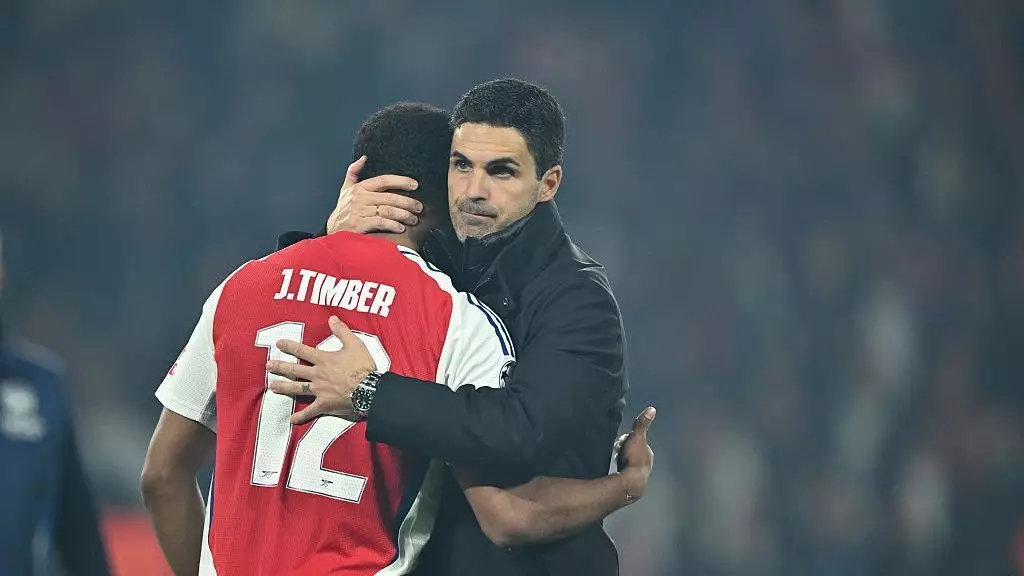There’s something poetic about a game of football—where dreams can be forged and shattered in the blink of an eye. Arsenal’s recent departure from the Champions League semifinals against Paris Saint-Germain (PSG) encapsulates this duality. The Gunners, under the leadership of Mikel Arteta, played with a palpable determination, as illustrated by their robust start in Paris. However, it was the lack of clinical finishing and a few ill-timed errors that ultimately cost them dearly. Arteta’s post-match sentiments—that Arsenal was the better team but fell short—echo a sense of injustice that many football fans can resonate with. This was not merely a defeat; it was a culmination of hope, skill, and heartbreak wrapped up in one mesmerizing contest.
The Fine Margins of Football
In a match where the key moments danced precariously on a knife’s edge, it’s clear that football thrives on precision and split-second decisions. Arsenal began the match in a whirlwind, with early opportunities that had the potential to shift the game’s momentum. Gabriel Martinelli and Martin Odegaard both came close, with PSG’s Gianluigi Donnarumma making phenomenal saves that seemed almost magical. Each blocked shot whispered the possibility of a different reality. Yet when it comes to tournament play, failure to capitalize on hard-won chances can haunt teams, and Arsenal’s inability to convert in critical moments will sting for a long time to come.
Myles Lewis-Skelly’s handball, which led to a missed penalty by Vitinha, underscores this narrative of misfortune. As the Gunners pushed for a goal, the tides seemed to turn in an instant, reminding fans that in elite football, unpredictability reigns supreme. The resilience that Arteta has inspired in his squad was palpable—they continued to fight and eventually got on the scoresheet with Bukayo Saka’s strike at the 76-minute mark—but by then, it was too little, too late. In football, success pivots on exploiting chances not merely on the pitch, but also on the scoreboard.
The Emotional Landscape of Defeat
Perhaps one of the most striking elements following the match was the visible emotion displayed by the Arsenal players. Tears welled up not just from loss, but from the realization of a collective dream that was within arm’s reach. Arteta’s pride in his squad radiated through his words, as he highlighted their desire and commitment, qualities that are often tested in the cauldron of competitive sports. It is this very passion and shared grief that forms a bond among teammates, which ultimately defines character and resilience.
Declan Rice’s reflection that “you have to lose a few in order to win” speaks to the core philosophy necessary for long-term growth. Losses can either cripple a team or galvanize it into an even more formidable force. The challenge ahead for Arsenal is not only moving past this moment but learning from it. Each setback in their quest for silverware—whether in recent finals or league matches—serves as an invaluable lesson, offering insights that should foster a culture of perseverance.
A Clash of Perspectives
A stark contrast emerged in the post-match dialogue between Arteta and PSG’s Luis Enrique. While Arteta firmly believed that the better team did not prevail, Enrique’s analysis reflected a fierce yet respectful defense of his squad’s performance. This debate encapsulates the complexity of football—disparities in interpretation often arise from allegiances and emotions surrounding a beloved sport. It is, however, more than just about who deserved the win; it illuminates the competitive spirit that fuels football’s enduring popularity.
As Arsenal faces the reality of a fifth consecutive season without a trophy, there’s an air of both disappointment and potential. Their inability to progress beyond semifinals—a recurring theme—reveals gaps that need bridging, whether in skill or composure. However, with a strong core of young, ambitious players eager to learn, there’s an undeniable belief that success is on the horizon.
Arsenal’s journey remains one that many identify with: an embodiment of resilience, tenacity, and the relentless pursuit of triumph. The road to victory is rarely linear; it often meanders through valleys of despair before reaching summits of joy. Thus, as the football world watches Arsenal evolve, one thing is clear: their narrative is far from over, and the lessons gleaned from heartache today may well forge champions tomorrow.

